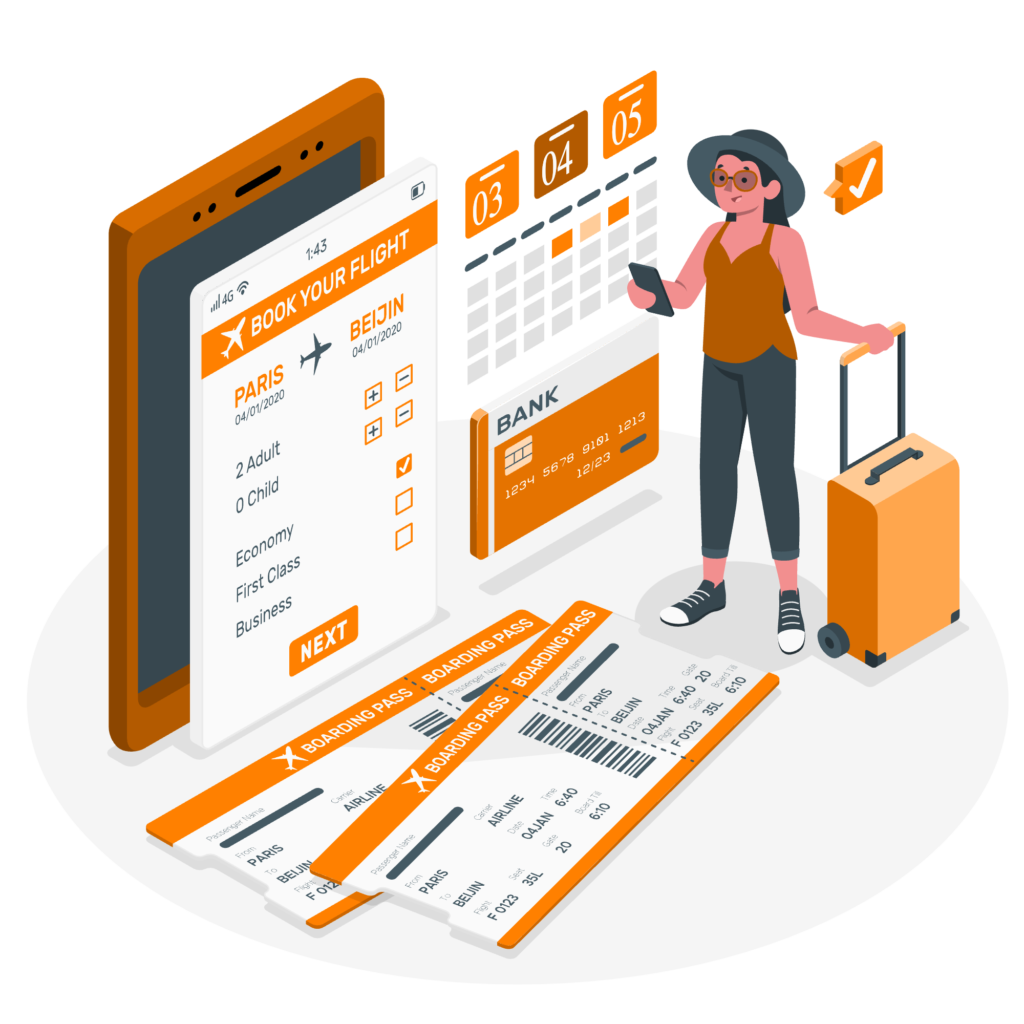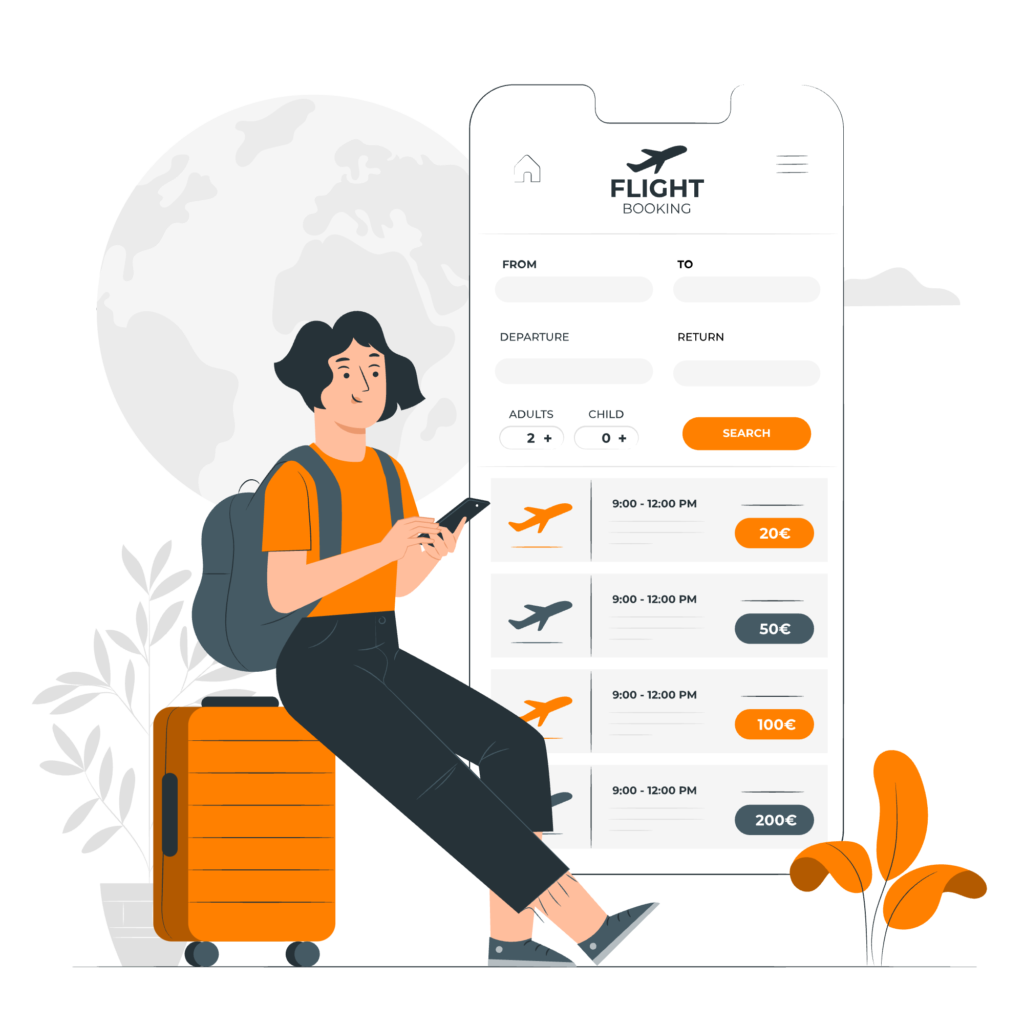The Ultimate Guide to Digital Marketing for Travel Agencies
Are you ready to take your travel agency to new heights in the digital age

In an era defined by rapid technological advancements and interconnectedness, the travel industry is undergoing a transformative shift. Amidst this evolution, digital marketing has emerged as a game-changer, reshaping how travel agencies engage with potential travelers and amplify their business. In this guide, we will delve into the profound importance of digital marketing in the travel sector and unveil how it serves as the catalyst for elevating travel agencies’ business to new heights.
Importance of Digital Marketing in the Travel Industry

The travel industry is no longer confined to glossy brochures and word-of-mouth recommendations. With the world at their fingertips, modern travelers turn to the digital realm for inspiration, research, and booking their dream getaways. This shift in consumer behavior has ignited the significance of digital marketing for travel agencies. Digital platforms have become virtual landscapes where travelers explore destinations, weigh options, and make decisions.
How Digital Marketing Can Boost Travel Agencies’ Business

Digital marketing is not merely a trend; it’s a powerful tool that can fundamentally alter the trajectory of a travel agency’s success. Through strategic utilization of digital channels, travel agencies can:
- Reach a Wider Audience: Digital platforms provide access to a global audience hungry for travel experiences. Your agency can tap into new markets and demographics.
- Enhance Visibility: Effective digital marketing strategies bolster your agency’s visibility on search engines and social media, making it easier for potential travelers to find you.
- Personalize Interactions: Tailoring marketing efforts allows you to engage with travelers on a personal level, addressing their unique preferences and needs.
- Amplify Brand Identity: Digital marketing enables you to showcase your agency’s unique selling points, storytelling prowess, and the value you bring to travelers.
- Drive Conversions: Well-crafted digital marketing campaigns can turn potential travelers into loyal customers by enticing them with compelling offers and experiences.
As the travel landscape evolves, travel agencies that embrace digital marketing are better poised to thrive in an ever-competitive market. This guide will navigate you through the intricacies of digital marketing strategies tailored to the travel industry, helping you harness the full potential of these tools to propel your travel agency’s success. From building an impressive online presence to engaging with travelers on social media and beyond, we will equip you with the insights needed to reshape your agency’s future through the lens of digital marketing prowess.
Understanding the Digital Landscape Travel Agency

In a world increasingly shaped by technology, understanding the digital landscape is pivotal for travel agencies aiming to navigate the modern travel industry successfully. This section provides an overview of the digital marketing landscape tailored specifically for travel agencies, shedding light on the key platforms and channels that can propel your agency’s reach and impact.
Overview of the Digital Marketing Landscape for Travel Agencies
Digital marketing has revolutionized the way travel agencies connect with travelers, turning once-unreachable destinations into virtual doorways waiting to be explored. The digital landscape offers a dynamic arena to showcase your agency’s offerings, captivate audiences, and ultimately convert browsing travelers into enthusiastic clients.
Key Digital Platforms and Channels
- Websites:
- Virtual Storefront: Your agency’s website is the cornerstone of your digital presence. It’s where travelers learn about your services, explore destinations, and make bookings.
- User Experience: A user-friendly and visually appealing website can significantly impact a traveler’s decision-making process.
- Social Media:
- Engagement Hub: Social media platforms like Facebook, Instagram, Twitter, and Pinterest allow you to engage with travelers, share visual content, and create a community around your agency.
- Influencer Collaborations: Partnering with travel influencers can extend your agency’s reach and credibility.
- Email Marketing:
- Personalized Communication: Email campaigns enable you to deliver tailored offers, travel tips, and exclusive deals directly to travelers’ inboxes.
- Nurturing Leads: Automated email sequences can guide travelers through their decision-making journey, nurturing leads into bookings.
- Search Engines (SEO):
- Discoverability: Implementing search engine optimization (SEO) techniques ensures that your agency’s website ranks higher in search results, making it more likely for travelers to find you.
- Keyword Strategy: Targeting travel-related keywords helps you attract users actively seeking travel information.
- Paid Advertising (PPC):
- Precision Targeting: Pay-per-click (PPC) advertising allows you to create targeted ads that appear when travelers search for specific keywords, ensuring you reach your ideal audience.
- Remarketing: PPC can be used to re-engage travelers who have previously visited your website but haven’t yet made a booking.
- Content Marketing:
- Showcasing Expertise: Creating informative and engaging content establishes your agency as an authority in the travel industry.
- Blogs and Guides: Publishing travel guides, destination insights, and travel tips can capture travelers’ interest and foster trust.
- Online Reviews and Reputation Management:
- Building Trust: Positive reviews and testimonials contribute to your agency’s credibility and reputation.
- Engagement: Responding to reviews, both positive and negative, shows your agency’s commitment to customer satisfaction.
As the digital marketing landscape for travel agencies continues to evolve, mastering these platforms and channels can set your agency on a trajectory of success. In the following sections of this guide, we will delve deeper into each of these elements, providing actionable insights and strategies to leverage them effectively for your travel agency’s growth.
How to Leverage Platforms for a Strong Online Presence

In today’s digital age, a strong online presence is the foundation upon which a travel agency’s success is built. This section explores the key components of establishing a robust online presence and how they contribute to enhancing your agency’s reach and impact.
The Significance of a Well-Designed and User-Friendly Travel Agency Website
Your travel agency’s website is more than just a virtual storefront; it’s a reflection of your brand and the gateway through which travelers embark on their journey with you. A well-designed and user-friendly website holds immense significance for several reasons:
- First Impressions: Your website is often the first interaction travelers have with your agency. A visually appealing and intuitive design creates a positive first impression, setting the tone for their entire experience.
- Showcasing Your Expertise: A thoughtfully designed website allows you to showcase your agency’s expertise, highlighting your range of services, destinations, and unique selling points.
- Engagement and Exploration: A user-friendly interface encourages travelers to explore your offerings. Easy navigation and clear calls-to-action make it effortless for travelers to find the information they seek.
Website Optimization for Better User Experience and Search Engine Visibility
Optimizing your travel agency’s website is not just about aesthetics; it’s about creating an exceptional user experience while also enhancing its visibility on search engines:
- Responsive Design: Ensure your website is responsive and accessible across various devices, including smartphones, tablets, and desktops.
- Page Speed: Fast-loading pages are essential for retaining user attention. Slow websites can lead to frustration and high bounce rates.
- User-Centric Content: Craft engaging and informative content that resonates with travelers. Use captivating visuals, compelling headlines, and clear descriptions.
- Search Engine Optimization (SEO): Implement SEO strategies to ensure your website ranks high in search results. This involves optimizing content, meta tags, headings, and incorporating relevant keywords.
Integrating Online Booking and Reservation Systems
Simplify the booking process for travelers by integrating online booking and reservation systems directly into your website:
- Convenience: Online booking systems provide travelers with the convenience of booking their trips at any time, from anywhere.
- Real-Time Availability: Instant confirmation and real-time availability updates enhance transparency and build trust.
- Personalization: Customize booking options to cater to various travel preferences, such as room types, meal plans, and activities.
- Secure Payment: Implement secure payment gateways to ensure travelers’ financial information is protected.
Building a strong online presence goes beyond having a website; it’s about creating a seamless and immersive digital experience that captivates travelers and compels them to choose your agency. In the subsequent sections of this guide, we will delve deeper into the intricacies of website design, optimization, and the integration of booking systems, providing you with actionable insights to bolster your agency’s online presence and leave a lasting impression on travelers.
How to Leverage Social Media to Boost Your Travel Agency’s Online Presence.

In an era where connections are made and stories are shared digitally, social media has emerged as a pivotal tool for travel agencies to captivate audiences, inspire wanderlust, and forge meaningful relationships with travelers. This section delves into the dynamic world of social media marketing and how it can reshape your travel agency’s approach to reaching and engaging potential clients.
The Role of Social Media in Travel Marketing
Social media platforms have evolved beyond mere networking spaces; they have become digital landscapes where travel inspiration is cultivated and travel decisions are influenced:
- Visual Storytelling: Social media allows you to tell your agency’s story through captivating visuals, transporting potential travelers to destinations and experiences.
- Engagement Hub: Platforms like Facebook, Instagram, Twitter, and Pinterest offer a direct channel for engaging with travelers, answering questions, and fostering a sense of community.
Choosing the Right Platforms for Your Target Audience
Selecting the most appropriate social media platforms for your travel agency ensures you connect with the right audience:
- Facebook: A versatile platform that allows detailed content sharing, event promotion, and engaging with a broad demographic.
- Instagram: Ideal for visually showcasing destinations, experiences, and cultivating an aspirational travel brand.
- Twitter: Enables concise communication, sharing quick updates, and participating in real-time travel conversations.
- Pinterest: A visual discovery platform where users seek inspiration, making it ideal for sharing destination pins, travel tips, and infographics.
Creating Compelling Visual Content: Photos, Videos, Stories
Visual content is the lifeblood of social media marketing for travel agencies:
- High-Quality Imagery: Share stunning photos of destinations, accommodations, and activities that evoke the desire to explore.
- Video Content: Create destination videos, travel guides, and virtual tours that provide immersive experiences.
- Stories: Utilize ephemeral content on platforms like Instagram and Facebook Stories to provide real-time updates, behind-the-scenes glimpses, and temporary promotions.
Engaging with Followers, Sharing Travel Tips, and User-Generated Content
Engagement is key in social media marketing for travel agencies:
- Two-Way Communication: Respond to comments, answer questions, and engage in conversations to build rapport.
- Travel Tips: Share practical travel advice, packing tips, and destination insights to position your agency as a valuable resource.
- User-Generated Content: Encourage travelers to share their experiences using your agency’s hashtag, showcasing real-life adventures.
- Contests and Giveaways: Organize contests that encourage user participation and engagement, expanding your agency’s reach.
In the interconnected world of social media, your travel agency has the opportunity to create an online presence that not only captures travelers’ attention but also resonates with their aspirations. Through strategic content creation, engagement, and leveraging user-generated content, you can establish a thriving social media presence that not only influences travel decisions but also solidifies your agency’s place as a go-to resource for unforgettable journeys. As you delve deeper into social media marketing strategies, the subsequent sections of this guide will provide actionable insights to maximize your agency’s social media potential.
How to Optimize Your Travel Agency Website for Voice Search

n the digital realm, the path to attracting travelers to your travel agency begins with search engines. Search Engine Optimization (SEO) is the compass guiding potential travelers to your offerings. This section unravels the intricacies of SEO and its indispensable role in shaping your travel agency’s online visibility and success.
The Basics of SEO and Its Importance in Travel Marketing
SEO is more than just a buzzword; it’s a strategic approach to enhancing your travel agency’s online presence and visibility on search engine results pages:
- Visibility: SEO improves your website’s ranking on search engines, ensuring that your agency appears at the forefront when travelers search for relevant terms.
- Credibility: Higher rankings establish credibility, as users often perceive top-ranking websites as reputable sources.
- Organic Traffic: SEO drives organic, non-paid traffic to your website, resulting in sustainable and cost-effective visibility.
Keyword Research for Travel-Related Topics and Destinations
Keywords are the foundation of effective SEO. Identifying the right keywords is essential to attract travelers seeking your agency’s services:
- Relevance: Focus on keywords that align with travel-related topics, such as destinations, travel packages, and activities.
- Long-Tail Keywords: Incorporate specific, longer phrases that potential travelers might use in their searches.
- Competitor Analysis: Research keywords used by competitors to identify gaps and opportunities.
On-Page Optimization, Meta Tags, and Schema Markup
Optimizing your website’s content and technical elements is pivotal for SEO success:
- On-Page Optimization: Incorporate target keywords naturally into website content, headings, and subheadings.
- Meta Tags: Craft compelling meta titles and descriptions that entice users to click through to your website.
- Schema Markup: Implement schema markup to provide search engines with structured data, enhancing the display of search results.
Local SEO Strategies for Attracting Travelers to Specific Destinations
For travel agencies, local SEO can be a game-changer in reaching travelers seeking specific destinations:
- Google My Business: Optimize your Google My Business listing with accurate information, images, and reviews.
- Local Content: Create location-specific content, such as destination guides, travel itineraries, and local event coverage.
- Local Backlinks: Earn backlinks from local directories, travel websites, and blogs that focus on your target destinations.
- User Reviews: Encourage travelers to leave reviews about their experiences with your agency, boosting local credibility.
Unlocking the Power of Pay-Per-Click Advertising: A Guide for Travel Agencies

In the digital marketing landscape, Pay-Per-Click (PPC) advertising stands as a dynamic and results-driven strategy for travel agencies to reach potential travelers precisely when they’re seeking travel-related information. This section dives into the world of PPC advertising, from its introduction in the travel industry to crafting targeted ads and implementing remarketing strategies for optimal engagement.
Introduction to PPC Advertising in the Travel Industry
PPC advertising is a model where advertisers pay a fee each time their ad is clicked. For travel agencies, PPC presents an opportunity to connect with travelers at the very moment they’re expressing interest in destinations and experiences:
- Instant Visibility: Your ads appear prominently on search engine results pages and social media platforms, capturing the attention of potential travelers.
- Cost Control: With PPC, you have control over your budget, targeting, and ad placements, ensuring optimal resource allocation.
- Performance Tracking: Detailed analytics allow you to measure the effectiveness of your campaigns, refining strategies for maximum impact.
Creating Targeted Ads on Platforms Like Google Ads and Social Media
Crafting compelling and targeted ads is the cornerstone of successful PPC campaigns:
- Google Ads: Leverage Google’s powerful advertising platform to create search ads that appear when travelers use relevant keywords.
- Social Media Advertising: Platforms like Facebook, Instagram, and Twitter offer advanced targeting options to reach users based on demographics, interests, and behaviors.
- Ad Copy and Visuals: Craft persuasive ad copy that resonates with travelers’ desires. Use high-quality visuals that showcase destinations and experiences.
- Landing Pages: Ensure that your ads direct users to dedicated landing pages that align with the ad’s message, enhancing user experience and conversion rates.
Remarketing Strategies to Re-engage Potential Travelers
Remarketing is a strategic way to reconnect with travelers who have previously interacted with your website:
- Remarketing Lists: Create lists of users who visited your website, and show them tailored ads as they browse other websites or social media platforms.
- Dynamic Remarketing: Display personalized ads featuring destinations or products users previously viewed on your website.
- Abandoned Carts: Remarket to users who added travel packages to their cart but didn’t complete the booking process, enticing them to reconsider.
- Cross-Selling and Up-Selling: Remarket related offers to users who have already engaged with your agency, encouraging them to explore additional options.
PPC advertising equips travel agencies with a laser-focused approach to reaching potential travelers, capitalizing on their intent to explore and make decisions. Through strategic targeting, compelling ad creation, and innovative remarketing techniques, your agency can engage travelers at every stage of their journey, from initial inspiration to the final booking. As we delve deeper into the intricacies of PPC strategies, the subsequent sections of this guide will provide actionable insights to amplify your agency’s impact and reach in the digital landscape.
How to Create Content that Captivates: Crafting Effective Content Marketing Strategies

Content marketing is a potent tool that empowers travel agencies to not only share valuable information but also connect deeply with travelers on their journey. This section delves into the art of crafting impactful content marketing strategies, from establishing expertise to leveraging storytelling to resonate with potential travelers.
How Content Marketing Can Establish Expertise and Engage Travelers
Content marketing serves as a bridge between your agency’s expertise and the information travelers seek:
- Positioning as an Authority: Through informative and insightful content, your agency can establish itself as a credible source of travel-related knowledge.
- Building Trust: Valuable content showcases your agency’s commitment to helping travelers make informed decisions, building trust and loyalty.
- Engagement and Interaction: Well-crafted content invites travelers to engage, share their thoughts, and seek further advice from your agency.
Blogging About Travel Destinations, Tips, and Experiences
Blogging is a cornerstone of content marketing for travel agencies:
- Destination Insights: Offer detailed destination guides that provide travelers with an insider’s perspective on attractions, activities, and local culture.
- Travel Tips: Share practical travel advice, packing tips, and guidance to enhance travelers’ journeys.
- Personal Experiences: Share travel stories and anecdotes from your team or customers, creating a sense of relatability and authenticity.
Creating Travel Guides, E-books, and Downloadable Resources
Delve deeper into travelers’ needs by providing comprehensive resources:
- Travel Guides: Curate in-depth travel guides that cover everything from must-visit sights to lesser-known gems.
- E-books: Compile e-books that offer in-depth insights on specific destinations, travel themes, or travel planning strategies.
- Checklists and Templates: Provide downloadable checklists, packing lists, and travel planning templates that simplify the preparation process.
Leveraging Storytelling to Connect Emotionally with Potential Travelers
Storytelling is a powerful way to evoke emotions and forge connections:
- Narrative Approach: Share captivating stories of travelers’ experiences, weaving in emotions and personal journeys.
- Destination Stories: Highlight the unique stories behind destinations, immersing potential travelers in the magic of a place.
- Human-Centric Stories: Showcase the people behind your agency, from travel experts to guides, adding a human touch to your brand.
Content marketing for travel agencies isn’t just about conveying information; it’s about crafting narratives that inspire, inform, and resonate with potential travelers on a personal level. By establishing expertise, sharing insights, and weaving compelling stories, your agency can create a meaningful digital experience that not only informs but also emotionally connects with travelers. As you embark on the journey of content marketing strategies, the subsequent sections of this guide will provide actionable insights to help you craft content that leaves a lasting impact on your audience.
The Importance of Online Reputation Management for Travel Agencies

In an interconnected world, a travel agency’s reputation extends far beyond its physical presence. Online reputation management is a critical aspect of ensuring that your agency’s image aligns with the exceptional experiences you offer. This section delves into the art of managing your online reputation, from monitoring reviews to showcasing success stories.
Monitoring and Responding to Online Reviews and Feedback
Online reviews serve as windows into travelers’ experiences and perceptions:
- Continuous Monitoring: Regularly monitor reviews on platforms like Google, TripAdvisor, and social media to gain insights into travelers’ opinions.
- Timely Responses: Respond promptly to both positive and negative reviews, showcasing your agency’s attentiveness to customer feedback.
- Constructive Engagement: Address concerns professionally, offering solutions and showing your commitment to improving the traveler experience.
Encouraging Positive Reviews and Addressing Negative Feedback
Positive reviews are a testament to your agency’s excellence, while negative feedback provides opportunities for growth:
- Encouraging Positive Reviews: Politely ask satisfied customers to leave reviews, making it easy for them to share their experiences.
- Turning Negative into Positive: Address negative feedback with empathy and a genuine desire to resolve the issue. Turning around a negative experience can make a lasting impression.
- Private Resolution: For more sensitive matters, offer a private channel to address concerns, demonstrating your agency’s commitment to customer satisfaction.
Showcasing Customer Testimonials and Success Stories
Customer testimonials and success stories amplify your agency’s credibility and the impact of your services:
- Spotlight Authentic Experiences: Share real traveler stories that highlight the transformative power of your agency’s offerings.
- Visual Testimonials: Use images and videos to accompany testimonials, adding authenticity and relatability.
- Before-and-After Stories: Share stories of travelers who embarked on journeys with your agency and experienced remarkable transformations.
Managing your online reputation isn’t just about maintaining a positive image; it’s about building a genuine connection with travelers. By attentively engaging with reviews, encouraging positive feedback, and addressing negative experiences, your agency showcases its commitment to traveler satisfaction. Moreover, sharing compelling success stories and testimonials adds depth and authenticity to your agency’s narrative, allowing potential travelers to envision their own extraordinary journeys. As you venture into the realm of online reputation management, the subsequent sections of this guide will offer actionable insights to help you navigate this landscape adeptly.
The Importance of Data Analytics in Optimizing Travel Agency Performance

In the digital realm, data is more than just numbers; it’s a treasure trove of insights that can guide your travel agency’s growth and success. This section explores the realm of data analytics and performance measurement, revealing how harnessing data can refine your strategies and steer your agency toward informed decisions.
Tracking the Effectiveness of Your Digital Marketing Efforts
Data analytics empowers you to measure the impact of your digital marketing initiatives:
- Website Analytics: Use tools like Google Analytics to track website traffic, user behavior, and conversion rates.
- Social Media Insights: Platforms provide data on engagement, reach, and demographics of your audience.
- Email Campaign Metrics: Monitor open rates, click-through rates, and subscriber behavior to optimize email campaigns.
Key Performance Indicators (KPIs) for Travel Agencies
Defining the right KPIs helps you measure success and identify areas for improvement:
- Website Traffic: Monitor the number of visitors, page views, and time spent on your website.
- Conversion Rates: Track the percentage of visitors who take desired actions, such as signing up for newsletters or booking trips.
- Engagement Metrics: Measure likes, comments, shares, and retweets on social media.
- Click-Through Rates: Evaluate the effectiveness of your email campaigns by analyzing how many recipients clicked on links.
- Return on Investment (ROI): Calculate the revenue generated compared to the investment in your digital marketing efforts.
Using Data to Refine Strategies and Make Informed Decisions
Data isn’t just for analysis; it’s a guide for refining your strategies and making impactful decisions:
- Identify Trends: Analyze data patterns to spot trends and adjust strategies accordingly.
- Optimize Campaigns: Use A/B testing to refine ad copy, visuals, and targeting based on data-driven insights.
- Responsive Adjustments: If data indicates a decline in engagement, adjust your strategies promptly to regain traction.
- Investment Allocation: Allocate resources based on the channels and strategies that yield the best results.
- Personalization: Utilize data to tailor your offerings, content, and marketing messages to individual travelers’ preferences.
Data analytics transforms digital marketing from guesswork into a precision instrument, enabling you to understand traveler behavior, adapt strategies, and make decisions grounded in evidence. As you delve into the world of data analytics, the subsequent sections of this guide will provide actionable insights to help you harness the power of data for your travel agency’s success.
Conclusion
As we draw the curtain on this comprehensive guide to digital marketing for travel agencies, it’s evident that the digital landscape has revolutionized the way travel agencies connect with travelers, inspire wanderlust, and drive business growth. Let’s recap the key takeaways that highlight the significance of embracing digital marketing in the travel industry.
Recap of Key Takeaways from the Guide
- Strategic Transformation: Digital marketing isn’t just an option; it’s a strategic imperative for travel agencies seeking to establish their presence in a digital world.
- Online Presence: Your travel agency’s website serves as the digital storefront. A well-designed, user-friendly website is a gateway to engaging potential travelers and converting them into loyal customers.
- Social Connection: Social media platforms offer opportunities to create engaging content, interact with travelers, and forge authentic connections that resonate on a personal level.
- Search Visibility: SEO is the compass guiding travelers to your agency. Strategic keyword targeting, content optimization, and local strategies elevate your agency’s visibility on search engines.
- Paid Precision: PPC advertising enables precise targeting and immediate visibility. Crafting compelling ads and utilizing remarketing strategies maximize your agency’s impact.
- Compelling Narratives: Content marketing establishes your agency’s expertise and captivates travelers through storytelling, travel guides, and downloadable resources.
- Reputation Management: Nurturing your online reputation through responsive engagement, encouraging reviews, and sharing success stories solidifies trust and credibility.
- Data-Driven Success: Data analytics transforms insights into actions, enabling your agency to refine strategies and make informed decisions that drive growth.
The Continuous Evolution of Digital Marketing in the Travel Industry
In the fast-evolving travel industry, digital marketing continues to redefine how travel agencies connect with travelers. As new technologies emerge and consumer behaviors shift, staying adaptable and innovative is key to staying ahead of the curve.
Encouragement to Implement Digital Marketing Strategies to Elevate Travel Agency Success
The road to travel agency success is paved with digital strategies that resonate with travelers, inspire exploration, and foster connections. By harnessing the power of digital marketing, your agency can transcend geographical boundaries, create meaningful experiences, and stand out in a competitive landscape.
So, as you embark on this digital journey, remember that the opportunities are vast, the tools are dynamic, and the impact can be transformative. Embrace the lessons learned in this guide and embrace digital marketing to not only boost your travel agency’s business but also to redefine how travelers experience the world. Your agency’s success story is waiting to be written in the digital realm.
Elevate Your Travel Agency with Digicarrom’s Expertise in Digital Marketing
Are you ready to embark on a journey of digital transformation for your travel agency? Look no further than Digicarrom! Our team of seasoned digital marketing experts specializes in crafting tailor-made strategies that will propel your agency’s success to new heights.
With a deep understanding of the travel industry’s nuances, we bring a unique blend of creativity and data-driven precision to every campaign. Whether you’re aiming to enhance your online presence, engage travelers through compelling content, or harness the power of SEO and PPC, Digicarrom has the expertise to guide you every step of the way.
Let’s collaborate to redefine the way your travel agency connects with travelers, builds relationships, and achieves remarkable growth. Contact us today to unlock the full potential of digital marketing for your travel agency. Your journey to digital success begins here with Digicarrom

Ready to take your travel agency’s digital marketing to the next level? Let Digicarrom be your trusted partner on this exciting journey. Our expertise in digital marketing for the travel industry can help you reach new heights of success.
Contact Digicarrom today and let’s embark on a digital marketing adventure that will transform your travel agency’s future. Together, we’ll inspire wanderlust and make every journey extraordinary.
Contact Us
Let’s create something awesome together. Reach out to us to hire the best talent for Real Estate Success
